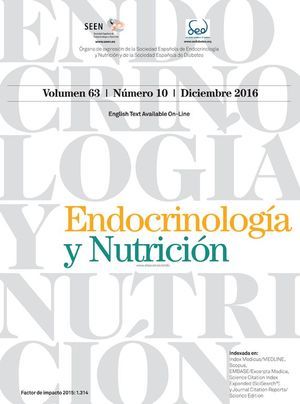Adrenocortical carcinoma (ACC) is a rare and aggressive disease, developed in adrenal cortex, most frequent in women (55–60%), with a peak incidence between 40 and 60 years and with an annual incidence of 0.7–2.0 per million population. Clinical presentation is due to an autonomous hormone excess production in 50–60% of cases, with hypercortisolism alone or mixed Cushing with virilization syndrome. Non-hormone-secreting tumors present with symptoms caused by the growth of the abdominal mass and nearly 10–15% are diagnosed as incidentalomas.1 Pure androgen excess is less frequent, and estrogen or mineralocorticoid excess and classical malignancy associated symptoms are very rare.2 Clinical hyperandrogenism is present in female patients when androgens are secreted while feminization and hypogonadism is present in male patients in estrogen-secreting tumors. Occasionally, tumors present with spontaneous ruptures and retroperitoneal hemorrhage. For the diagnosis, blood test analysis of hormonal levels and adrenal images to define the tumor's characteristics are demanded. Median overall survival is about 3–4 years, heterogeneous regarding the disease stage at diagnosis: five-years survival of ACC rates are between 60 and 80% for localized tumors, 35–50% for locally advanced disease and 0–28% in metastatic disease.1 Cortisol-secreting ACC are associated with a worse overall survival.3 Radical surgery in localized ACC is the only mean of cure. In those with advance stage, mitotane is indicated as adjuvant treatment. If therapeutic levels of mitotane are not reached or the patient's tumor progresses, chemotherapy with EDP (etoposide, doxorubicin, cisplatin) should be added to mitotane.
Hereby, we present an unusual presentation of advanced ACC in a 73-year-old woman with no toxic habits, and previous history of idiopathic amaurosis fugax under chronic prophylactic treatment with 100mg daily of acetylsalicylic acid (ASA).
In mid-2020 she was admitted for a four-week evolution of general discomfort, asthenia, hyporexia and leg edemas. The previous two weeks she came to the emergency room with dark stools and hypokalemia of 2.65mmol/L (3.40–4.50) being discharged after potassium replacement and pending to complete studies ambulatory. She only took ASA, no other drugs were associated and had not been subjected to acute stress. Physical examination showed central abdominal accumulation of adipose tissue, low hirsutism (10 point on Ferriman–Gallwell scale), soft, nontender nor distended abdomen, mild edema in legs. Rectal examination revealed an empty rectal blister with melaena. The rest of the examination was within normality. Upon admission, the patient weighted 62kg and the body mass index was 24.8kg/m2. Blood test results showed a decrease of 5 points in hemoglobin from 131g/L to 79g/L in ten days; while coagulation, platelets count, kidney function, electrolytes, glucose and blood pressure, remained within the normal range. The gastroscopy showed an excavated 2cm-ulcer with irregular borders in the lesser gastric curvature, with active bleeding (Forrest IIa) that was cauterized. The biopsy showed signs of chronic gastritis and positivity of Helicobacter pylori, even though no eradication treatment was started until completing studies. Patient's previous medical history revealed a 4-month history of hirsutism and increased libido. During admission, the full hormone workout showed a low follicle-stimulating hormone (FSH) 2.7;U/L (23–116) and luteinizing hormone (LH) 0.18U/L (15.9–54), an elevated free testosterone 426ng/dL (10–50), an elevated sulfate dehydroepiandrosterone (S-DHEA) 8.37mcg/mL (0.15–2.24) and a low corticotropin (ACTH) of <5pg/dL (10–60) with high serum morning cortisol 41mcg/dL (10.0–25.0), no suppression after overnight 1mg Dexamethasone test and high free urine cortisol of 1492mcg/24h (20–100). The 17B-estradiol 29pg/mL (<37), progesterone 6.62ng/mL (7–13) and aldosterone 4.9ng/dL (<30) were within normal values. Thoracoabdominal computed tomography (CT) revealed a large solid mass of 85×56×77mm (AP×TR×CC) with necrotic–cystic areas suggestive of a primary neoproliferative process of the left adrenal gland and peritoneal implants and carcinomatosis. The mass contacted and infiltrated the posterior wall of the gastric fundus next to cardias and pancreas tail. On the exploratory laparoscopy biopsies there was infiltration by neoplastic cellularity with positive immunohistochemistry for Synaptophysin, Melan-A and Alpha Inhibin. Finally, our patient was diagnosed of an advanced ACC stage IV(1). The patient started mitotane and chemotherapy with Etoposide, doxorubicin and cisplatin (EDP) plus mitotane. Metyrapone was initiated to control rapidly hypercortisolism.
The usual presentation of ACC is due to increased production of adrenocortical hormones, frequently cortisol and androgens.4 Given the rapid progression of the disease the usual features of Cushing syndrome (CS) are not complete. Patients usually present with catabolic syndrome, hyperglycemia, hypertension, thromboembolic events and hypokalemia. The presented case showed only hypokalemia with normal-low glucose levels and blood pressure in within the range. Moreover, she had hirsutism and increased libido due to androgen secretion.
Here we report a case of a rare presentation of cortisol and androgen secretory ACC, with ulcer and upper gastrointestinal bleeding. Interestingly, earlier reports associated CS with peptic ulcer disease especially in the presence of concomitant infection with Helicobacter pylori or nonsteroidal anti-inflammatory drugs use.5,6 More recent evidence showed that probably neither exogenous nor endogenous corticosteroid excess directly causes peptic ulcer or Helicobacter pylori infection, with even higher mortality.7,8 Hypercortisolism may be associated with painless peptic ulcer disease with delayed ulcer healing, which potentially results in serious gastro-intestinal complications.9
More intriguingly, hypercortisolism induce a prothrombotic state that last even after cure of the CS10 by altering coagulation factors, fibrinolysis and potentially increasing the platelet account.
To the best of our knowledge this is the first report of an ACC associated with CS and hyperandrogenism that was presented as an upper gastrointestinal bleeding. It is very probable that besides hypercortisolism, the combination of other factors like the use of even prophylactic dose of ASA, the chronic inflammation of the gastric wall due to the tumoral infiltration and the infection with Helicobacter pylori contributed to the upper intestinal hemorrhage.
This case illustrates the importance of the differential endocrine diagnosis in hypokalemia and moreover indicates that untreated hypercortisolism is not extent from acute hemorrhagic complications. Therefore, we considered appropriate to report it to carry out an earlier diagnostic and treatment.






